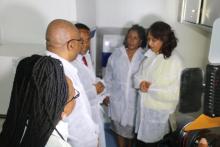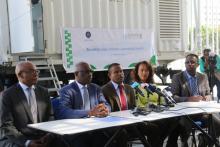WHO supports Ethiopia to Obtain Biosafety Level 3 Mobile Laboratory
10 November 2016, ADDIS ABABA | WHO Country Office in Ethiopia along with the UN Country Team handed over a Biosafety Level 3 Mobile Laboratory to The Ethiopian Public Health Institute. As a result, Ethiopia now has the in-country capacity to diagnose disease-causing microorganisms, including viral hemorrhagic fevers and other emerging viruses. This is because of Ethiopia’s recent acquisition of a Biosafety Level Three Laboratory (BSL3) which meets the World Health organization standards. The Biosafety Level Three Laboratory is specially designed to protect laboratory personnel as well as the environment from the highly contagious disease causing agents.
The occasion took place this morning at the UNECA compound in the presence of UN Country Representatives, government officials, invited guests, and media among others. On the occasion it was noted that this laboratory is the first of its kind in Ethiopia, and efforts will be made to acquiring more in a bid to strengthen the health system.
Ethiopia’s Biosafety Level Three Laboratory was made possible through an extraordinary technical and financial partnership between the Federal Ministry of Health (FMOH) and WHO, UNFPA, UNDP, WFP, UNICEF, UNHCR, and ECA under the United Nations Country Team (UNCT) in Ethiopia. It is to be recalled that the acquisition of this mobile lab was decided at the time of the Ebola outbreak. The UNCT wanted to demonstrate its solidarity and support to the Federal Ministry of Health in its efforts to prevent the spread of the virus to Ethiopia.
Speaking at the ceremony to launch the laboratory, Mr. Faustin Yao, Country Representative, UNFPA, noted “having this modern biosafety laboratory in place constitutes a much desired impetus to Ethiopia’s ongoing efforts to control highly dangerous communicable diseases in the context of a complex global health security arena. It is a timely boost to Ethiopia’s national capacity for detecting, containing and responding effectively to communicable disease outbreaks.” He added that “the mobile nature of the laboratory provides a viable alternative to fixed laboratories especially in areas where setting up a laboratory is not possible during emergencies.”
Speaking on behalf of Ethiopia’s Health Minister while receiving the mobile laboratory Dr. Amha Kebede, Director General, Ethiopian Public Health Institute, noted that “should there be a dangerous outbreak like Ebola, Ethiopia now has the capability to isolate the possible disease causing micro-organisms, and launch a timely and evidence-based response.” Furthermore, he lauded the synergetic efforts of several UN Agencies (WHO, UNDP, UNECA, UNFPA, UNHCR, UNICEF, UNOPS, and WFP, as well as the UNCT for their strong partnership with the Federal Ministry of Health of Ethiopia, which made the acquisition of this mobile lab possible.
The Biosafety Level Three Laboratory, valued at one million US dollars, equips Ethiopia with the critical resource needed to work with and respond to highly infectious disease causing micro-organisms. The WHO Country Office in Ethiopia has not only contributed USD 200,000; but also supported technically in identifying the specification as well as compliance.
Practitioners on the ground can now provide evidence-based and timely local response, thus enabling containment of any emerging biological threat before it spreads within its area of origin or to other areas of the world.


